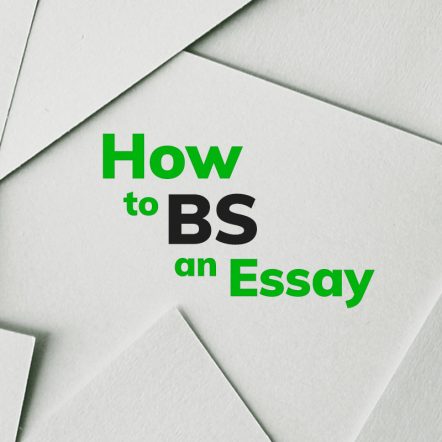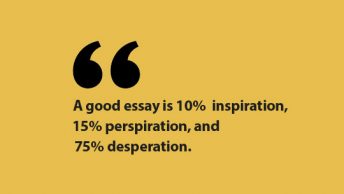I think everyone can agree that word counts suck. It seems like writing an essay about some boring book just isn’t stressful enough so teachers and professors ask you to write a certain number of words, regardless of whether or not you actually have something to say about the topic. Obviously, meeting the word count is most difficult when you know nothing about the subject of your paper, but it’s not always the case.
For example, when I like a topic, I know exactly what I want to say, and I don’t need 1,000+ words to do it. Let’s say, you’ve conveyed all the great ideas you have and explained your opinion in just 500 words. In this case, there are still 500 words left. That’s the moment when you realize that the only way to meet stupid requirements is to bullshit your essay all the way through the rest of the paper. Unfortunately, even if your essay is brilliant but not long enough, you won’t get an A.
Some people think that they can just add a bunch of filler words and hope that their teacher won’t notice it. However, bullshitting an essay isn’t that easy. The thing is that fillers will hurt clarity. Teachers know what students can do to make their essays longer so the “bullshit” part in your essay shouldn’t be obvious. You shouldn’t look desperate trying to write more than you actually can.
There is a reason why writing assignments have word counts. Your teachers don’t encourage you to write meaningless stuff just for the sake of writing practice. They know that writing lengthy papers is challenging and they want you to approach this task creatively. What you have to do is come up with more points and use them to expand your essay. Consider the minor details about your subject that didn’t grab your attention at first. Ask yourself more questions and answer them. The point is to make your essay longer in an effective way. So, the question is, how to bs an essay properly? Here are some tips that work for me, and I hope they’ll also work for you.
Here's How to BS an Essay
First of all, you need some basis that you can work with. I mean, your essay must have a substantive core so that you can add some bs to it and make it longer. Check out the details of your assignment and determine your task. For example, you may need to explain your research or to answer a specific question. This way, you will know what to focus on when writing the basis for your essay. Just don’t contact your professor at the last minute because he or she will understand that you didn’t spend much time working.
Break Down Your Ideas
To make your essay longer, you have to break down your ideas into different aspects and details so that you can consider them separately in the body of your essay. Let’s say, you can describe your general idea in two paragraphs. If you break it down into several aspects, you’ll be able to write a paragraph about each aspect, which is exactly what you need. But what to do if you don’t know how to break it down?
The solution is simple. Take your prompt and rewrite it several times. I recommend that you do it in question form so that you can answer each particular question. Even the very writing process itself may help you if you also write down your associations with the essay question and topics that appear to be relevant in this context. Even if some ideas don’t seem to be related, you can turn it to your advantage by writing about them in a compare-and-contrast manner.
You’ll also be able to write more if you try to illustrate each of your points with examples and describe each example in detail. Usually, I keep splitting my ideas until I can select specific sources or even quotes for every one of them.
Write a Catchy Introduction
Now it’s time to write a catchy introduction. It must give your readers a basic understanding of what your paper will be about. Some people choose to write an introduction last so that they can reflect on a complete paper and decide what to highlight in the introduction. However, given that you’re going to just make up a bunch of unnecessary sentences for most of your essay, there’s no need to wait. Quite the contrary: you can use the introduction as a navigation tool that will help you get back on track if you diverge from the topic too much.
The most important part of the introduction is a hook. It must motivate your readers to read the whole thing and create an impression of a substantial and interesting paper. After this, provide a good thesis statement. The introduction is crucial for your success because a well-written introduction can distract your teacher from the rest of the essay.
Write the Body Section
Well, write as much as you can. I recommend freewriting based on a few points that you remember from class. Analyze these points, provide original opinions and develop your thoughts. Remember that your goal is to write more, so don’t just state a point but think about it. Provide some background information that will help your readers understand it, and explain your point from different angles.
A great approach that will help you increase the word count is addressing opposite opinions. Considering other points that you don’t agree with will not only help you write more but also make your essay more interesting.
Write Conclusion
Make sure that your conclusion is as impressive and strong as the introduction. Restate your thesis statement, remind your readers of the most important points from the body of your essay, and add some meaningful final words. Although the conclusion should be relatively short, you can use this section to consider your subject in a broader context. It means that you won’t need any actual evidence. Instead, you can just write about anything related to the subject, which makes your thesis statement significant or motivates your readers to keep thinking about the topic of your essay.
Well, that’s all well and good, but isn’t this article called “how to bullshit an essay?” Let’s get to the fun part.
Now that you have something to work with, it’s time to inflate your essay so that it will meet the requirements. The first thing you should do to add more words to your essay is to add quotes. The easiest way to do it is to simply google “quotes about [enter your subject].” The only problem is that it can be difficult to find long, meaningful quotes this way so I use Google Scholar because it helps find academic sources. However, if using Google Scholar seems too difficult, check out the next tip.
The main secret is to use block quotes. This way, you’ll add a few lines of text with a single quote, which is perfect. However, you can’t use too many quotes because it will look suspicious. Fortunately, there is another way to use someone else’s ideas in your essay: just paraphrase passages that look relevant. If you’ve already added a few block quotes but you still need more text, rewrite some quotes in your own words (this way, you’ll be able to make them even longer). Just don’t forget to properly cite all the sources because you don’t want your paper to suffer from plagiarism. Besides, the citations section itself will also help you increase the word count.
If using Google Scholar and other academic sources is just too much for you, here’s the good news — you can use Wikipedia! Of course, most professors and teachers tell their students not to use it because it’s full of unreliable information and no one checks its articles for credibility. But since you want to bullshit your essay, isn’t it the perfect solution?
The truth is that Wikipedia can help you quickly find relevant sources on almost any topic. You can always find a bunch of sources at the end of any article. However, it’s important to select credible sources, such as scientific journals and books written by reputable experts. Make sure to cite any sources properly and don’t indicate Wikipedia itself as your source.
TL;DR
When writing an essay, meeting the required word count can be a real pain in the ass. But here’s the good news: you don’t need to actually make your essay more meaningful, providing more original ideas. Just break down your ideas into more specific aspects and consider them separately. Rewrite your essay question to look at it from different angles, and make sure that your introduction and conclusion are impressive enough to distract your professor from a mediocre body.
You can always use an essay writing service if you don't feel like spending hours on trying to hit the word count. A professional essay writer will write a decent paper in a matter of hours, saving you time and nerves.
Another great approach is to use block quotes and paraphrase sources more often. Several lines of somebody else’s text will work as good as your own words when the goal is to write a lengthy paper. Still not sure how to bullshit a paper? Just buy your essay on the internet and forget about any troubles!



